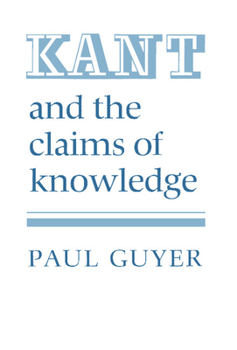Kant and the Claims of Knowledge
Select Format
Select Condition 
Book Overview
This book offers a radically new account of the development and structure of the central arguments of Kant's Critique of Pure Reason: the defense of the objective validity of such categories as substance, causation, and independent existence. Paul Guyer makes far more extensive use than any other commentator of historical materials from the years leading up to the publication of the Critique and surrounding its revision, and he shows that the work which has come down to us is the result of some striking and only partially resolved theoretical tensions. Kant had originally intended to demonstrate the validity of the categories by exploiting what he called 'analogies of appearance' between the structure of self-knowledge and our knowledge of objects. The idea of a separate 'transcendental deduction', independent from the analysis of the necessary conditions of empirical judgements, arose only shortly before publication of the Critique in 1781, and distorted much of Kant's original inspiration. Part of what led Kant to present this deduction separately was his invention of a new pattern of argument - very different from the 'transcendental arguments' attributed by recent interpreters to Kant - depending on initial claims to necessary truth.
Format:Paperback
Language:English
ISBN:0521337720
ISBN13:9780521337724
Release Date:December 1987
Publisher:Cambridge University Press
Length:500 Pages
Weight:1.56 lbs.
Dimensions:1.2" x 6.1" x 8.9"
Customer Reviews
2 ratings
a great resource
Published by Thriftbooks.com User , 19 years ago
guyer has delved into the intricate arguments that kant has put together and tries to make sense of them through analysis and argument. this is a very helpful text for a student of kant who needs a fresh view into what kant is trying to do in the critique of pure reason.
Kant without tears
Published by Thriftbooks.com User , 20 years ago
Kant is famous for his claim that space and time are forms of intuition imposed by our cognitive constitution on the raw material of sensation, rendering our empirical world of experience a world of appearances. Thus was provided the foundation of Kant's Transcendental Idealism (TI), a doctrine of synthetic a priori truths aimed at refuting Humean skepticism. But the argument carried a cost, in the form of an unbridgeable gap between the world we know and a bizarre reality beyond the possibility of human experience where our notions of space and time do not apply. Kant does not posit that space and time might not apply in the world of "things in themselves," or the agnostic view that we simply can't know whether or not they apply in that world, but rather he insists that they cannot possibly apply. The reality of space and time are explicity rejected. Guyer argues that this rejection lacks justification, that Kant fails to present any argument that invalidates the realist hypothesis that space and time are, in fact, features of a real world of objects, and that our perceptions of space and time therefore provide a basically accurate representation of reality. In other words, Kant fails to make the case that space and time cannot be both necessary aspects of human sensibility and also characteristic of things in themselves. The question of why Kant rejected this obvious and seemingly attractive possibility, known as Trendelenburg's missing alternative, is the major subject of Guyer's thoroughly impressive book. The explanation, in schematic form, is that Kant could not see how to support his notion of synthetic a priori knowledge other than in a world of representations that universally and necessarily incorporated space and time as built-in products of human sensibility. His theoretical edifice would be undermined, he thought, if space and time characterized a world of things in themselves existing outside of human perception, because in such a world space and time could only be contingent, and not a matter of necessity. Needless to say, no two-sentence sketch can do justice to the richness of Guyer's sophisticated and extremely well-researched argument. This is a very skillfully-argued analysis of the logical foundation of Kant's Transcendental Idealism, a foundation that is found to be deeply flawed. It can be seen as a riposte to Henry Allison's book defending Kant's TI; I found it to be overwhelmingly persuasive. Highly recommended.






